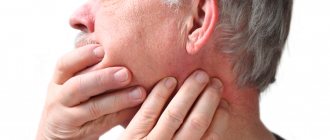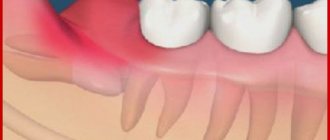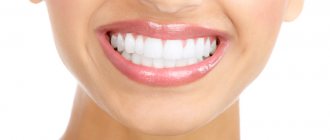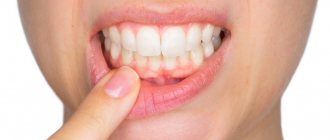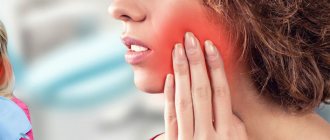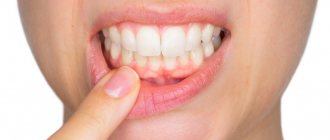Aching teeth: causes of pathology
When a patient comes to see a dentist and asks why his teeth are hurting for no reason, every good doctor will answer that this does not happen. There are always reasons. Any dental problem has its roots, and aching pain in the teeth is no exception. Another point is that the causes of this symptom are quite extensive and can be associated with a number of characteristics of the body and disturbances in the functioning of its systems. Experts identify more than a dozen factors that can cause aching pain in the teeth.
- Congenital hyperesthesia.
Increased sensitivity of enamel can be inherited, which is why a person may experience discomfort when exposed to temperature and chemicals. - Chips, cracks and other damage to the enamel.
Tooth injuries lead to dentin exposure and also facilitate the penetration of pathogenic microorganisms. - Thinning and weakening of enamel.
This can happen for several reasons. First of all, due to a lack of vitamins and minerals. The second common reason is weakening of the enamel as a result of frequent whitening procedures. - Caries and its complications.
Typically, aching pain in the teeth occurs in the middle stages of the disease. - Periodontal diseases in the active stage.
With periodontitis and periodontal disease, the necks of the teeth are exposed, which makes them (and surrounding tissues) very sensitive to irritants. The same applies to the wedge-shaped defect. - Infectious diseases,
especially chronic ones. Influenza, sinusitis, sinusitis - these diseases can sometimes provoke aching pain in the teeth and jaw. - Problems with the gastrointestinal tract.
- Stress, fatigue, lack of sleep.
- Hormonal disbalance.
Often, aching pain in the teeth occurs during pregnancy. - Inflammation of the trigeminal nerve,
when the pain “radiates” to the teeth. - Allergic reaction
to medications.
Physiological processes
The most common factors that cause pain at night are physiological. Most often, this phenomenon is caused by a horizontal position taken during rest. In this position, blood flows intensely to the head, brain and jaws, which increases pressure on the inflamed tissues and nerve endings of the teeth. It should be noted that this process is not typical for all dental diseases. The most common cause of acute and severe toothache at night is pulpitis. At this time of day, excessive pressure forms in the inflamed pulp due to increased blood flow, and bundles of nerve fibers begin to send active signals to the central nervous system. Excruciating pain, mainly at night, can also occur with periodontitis and periodontitis.
Diagnosis of pathology
For any manifestations of pain and discomfort, you should contact a specialist as soon as possible. Only a qualified doctor can correctly diagnose and identify the exact cause of the problem. If a patient comes with a complaint of aching pain in the teeth, a number of standard diagnostic procedures are first performed:
- visual examination of the oral cavity using a probe;
- tracking reactions to temperature stimuli;
- X-ray examination, which can reveal the presence of hidden problems and complications (granulomas, cysts, etc.).
If the pain and aches in the teeth are not directly related to dentistry, the attending physician refers the patient to other specialists. Most often this is a neurologist and maxillofacial surgeon. The localization of pain also helps to determine the root cause.
- Local.
Aching pain covers one or more teeth. This is usually associated with injuries and dental diseases. In some cases, this is a consequence of infectious diseases. - Generalized.
The entire dentition “aches.” The reasons why all teeth ache are usually associated with pathologies and diseases of the enamel.
The teeth of the lower jaw often ache more (especially the front incisors). In many people, they react more strongly to temperature changes, chemical irritants and inflammation of the trigeminal nerve, when pain responds in the anterior part of the lower jaw. On the other hand, the answer to the question why the lower teeth ache is exactly the same as in the case of the upper teeth: there are no separate reasons.
Why is this happening?
The most common causes are the following factors:
- Presence of carious cavities. In this case, pain occurs when eating. Discomfort extends to the entire dentition.
- A cyst localized on the root of a tooth. When it reaches its maximum size, the neoplasm can compress the nerve endings, which is what causes this alarming sign.
- Inflammation of the pulp. In the presence of this dental disease, acute, unbearable radiating pain occurs. The problem is only in one tooth, but it feels like the entire dentition is bothering you.
- Enamel hyperesthesia. We are talking about increased sensitivity of units. When eating foods that are too hot, cold, sour or sweet, a person feels severe pain.
- Trinitarian neuralgia. The most common cause of this symptom. The pain is very piercing; there is a feeling that absolutely the entire lower part of the face, including all the teeth, is bothering.
There are also a number of pathological processes that are not dental. For example, we can talk about ear pain. Discomfort spreads to the jaw, the pain is throbbing and acute. Having eliminated the root cause (that is, inflammation in the ear), pain in the oral cavity will go away on its own; no separate treatment is required.
How to treat aching pain in teeth?
A treatment plan is drawn up after the diagnostic results, when the cause of the pathology is identified and pain is localized. Conventionally, several techniques can be distinguished that are used depending on the factors contributing to the occurrence of pain.
- Therapeutic treatment. It is prescribed when the main cause of aching pain is caries or periodontal disease. In case of caries, filling or endodontic treatment is carried out (if bacteria have penetrated the pulp). In case of periodontal inflammation, special ointments and antiseptics are prescribed, curettage is performed, and in severe cases, teeth are splinted.
- Prosthetics. In the presence of a wedge-shaped defect and serious damage, dental prosthetics are performed with single crowns or bridges. In case of enamel pathologies, the doctor may recommend veneers, which are installed to achieve a certain aesthetics.
- Restoration and strengthening of enamel. What to do if all your teeth ache? If the patient has weakened and thinned enamel, it is necessary to strengthen it. First of all, the doctor treats the enamel surface with special compounds based on calcium and phosphorus, and also prescribes a special diet and means that strengthen the immune system and the health of the body.
To eliminate pain, painkillers (Nurofen, Nimesil and others) can be prescribed. If the aching pain is not associated with dental problems, treatment is carried out by doctors of relevant specializations.
What you can do yourself
If a toothache suddenly appears, you should:
- apply a cold compress to the cheek on the sore side; heat treatment is contraindicated, as this increases blood circulation and leads to the spread of infection;
- examine your teeth, identify possible food debris, remove them and rinse your mouth with a warm solution and soda;
- take a pain reliever (Ketanov, Diclofenac, Solpadeine);
- Visit your dentist as soon as possible for an x-ray.
Note! Dentists recommend using Nimesil powder to quickly relieve pain.
Photo 2: After a dental examination, the doctor will carry out professional hygiene and sanitation of the oral cavity, after which the dentist will prescribe medications. Source: flickr (Aviel Stankevitch).
Prevention of aching teeth
The best way to prevent an unpleasant symptom is to follow preventive measures. Despite the fact that the enamel itself is very strong, improper lifestyle and exposure to the external environment gradually weaken and destroy it. If you have sensitive enamel, you need to carefully choose hygiene products. In particular, it is recommended to avoid hard toothbrushes and use toothpastes with calcium and fluoride. An equally important point is the right diet. It is necessary to reduce the consumption of spicy, sour and sweet foods to a minimum, and give preference to fermented milk products and foods high in vitamins A and B. Temperature changes are a big stress for sensitive enamel, so the best solution is to drink drinks at room temperature.
Publisher: Expert magazine about dentistry Startsmile.ru
Author of the material: Yaroslav Ikonnikov
When should you see a doctor immediately?
When toothache occurs at night, most people try to postpone a visit to the doctor at least until the morning, but they often forget about the problem, especially if the discomfort subsides. This approach can lead to serious complications, including sepsis and other serious diseases; Moreover, there are a number of cases when a person needs medical care immediately.
At the dentist's office
It is necessary to call an ambulance or go to a 24-hour dental clinic in cases where toothache is accompanied by the following symptoms:
- severe swelling that spreads to one part of the face;
- temperature increase;
- difficulty swallowing or breathing;
- numbness or loss of sensation in the affected part of the face;
- severe headache, dizziness, rapid heartbeat.
Cheek swelling
In addition, it is necessary to immediately consult a doctor in cases where nighttime toothache constantly intensifies and is not relieved by painkillers.
First aid
What can you do to get rid of toothache at night? The best option is to take an analgesic or non-steroidal anti-inflammatory drug (Ketanov, Ibuprofen, Tempalgin, Ketorol, etc.). Another option is to use ointments or gels that relieve pain and reduce inflammation - these include Metrogyl Denta, Solcoseryl, Asepta, and Cholisal.
"Ketorol"
You should not use antibiotics to get rid of toothache - a single dose of a tablet will not have the desired effect, and in addition, it can blur the overall picture of the disease. It is also not recommended to take drugs such as Analgin and No-shpa. The first has a large number of side effects, and the second is designed to relieve spasms, so it is simply ineffective for toothache.
"Analgin"
If there is a carious cavity in the tooth, you need to rinse your mouth, carefully clean the cavity and place a piece of cotton wool soaked in clove oil, hydrogen peroxide or lidocaine. In addition, you can use special dental drops (for example, Dentaguttal) - they contain valerian tincture, camphor oil and clove oil, due to which they have an analgesic and anti-inflammatory effect.
"Dentaguttal"
The simplest and most accessible remedy for night toothache is rinsing with a soda solution (a tablespoon in a glass of water, rinse every hour). Instead of a soda solution, sometimes a saline solution is used - dissolve a teaspoon in a glass of water, add 5-6 drops and rinse the affected area. This solution reduces inflammation and tissue irritation and relieves swelling well.
When you have a toothache, it is better to lie on high pillows so that the blood drains from the head and does not put pressure on the nerve endings, and to reduce discomfort, you can apply a cold compress to your cheek. But in such cases it is prohibited to heat the affected area - if the cause of the pain syndrome lies in the inflammatory process, heat can lead to the proliferation of pathogenic microorganisms and worsening the condition.
Cold compress
Treatment options
The choice of treatment for a diseased tooth often depends on the degree of advanced disease. At the initial stage, caries is removed using a drill, and upon completion, a filling is installed. When the extent of the damage is more extensive, one of the following technologies is used.
- Veneers are one of the most preferred options. These are thin plates that are made of ceramic porcelain. They are installed on the outer surface of the tooth, correcting its shape. Veneers are made individually for each client, using a tooth impression. If the plate is properly manufactured and installed, it will last an average of 25 years.
- Crowns are used when there is practically nothing left of the tooth. Another indication for installing crowns is the destruction of the cutting edge of the tooth. Just like veneers, they are made individually for each client, exactly repeating the color of adjacent teeth.
- Implants are used when there is nothing left of the tooth. Implantation of anterior teeth takes place in several stages. A pin is installed in the bone in place of the former tooth. Some time after the gums have healed, a crown is placed on the post. This method is not suitable for everyone and has many contraindications, and it is also expensive. However, he has proven himself very well.
- Restoration with a pin is used when the tooth root is not yet damaged. Pins are installed inside the channels, on top of which a crown is attached. The outer surface of the tooth looks natural, its color is as similar as possible to the neighboring teeth.
- A prosthesis, unlike an implant, is significantly cheaper in price. Various fasteners and materials are used in the manufacture of prostheses. The most common type is a bridge. In this case, a crown is made for 3 teeth: one patient and 2 adjacent healthy teeth.
